Meeting
2019 Gastrointestinal Cancers Symposium

Princess Margaret Cancer Centre, Toronto, ON, Canada
Hamzeh Albaba , Anna Dodd , Rebecca M. Prince , Kyaw Lwin Aung , David W. Hedley , Steven Gallinger , John Kim , James D. Brierley , Shari Moura , Stephanie Moignard , Adriana Fraser , Shawn Hutchinson , Osvaldo Espin-Garcia , Carolanne Moulton , Alice Chia-chi Wei , Paul David Greig , Ian M McGilvray , Neesha C. Dhani , Elena Elimova , Jennifer J. Knox
Background: Patients with pancreatic ductal adenocarcinoma (PDAC) have limited treatment options. Management of complex symptoms and psychosocial implications requires an interprofessional approach as prognosis is often measured in months. A multidisciplinary approach has been associated with improvement in clinical outcomes including survival. We aimed to evaluate the impact of an inter-professional approach for PDAC patients at the Wallace McCain Centre for Pancreatic Cancer (WMCPC) at PM on their management and clinical outcomes. Methods: We undertook retrospective review of all patients with PDAC seen at PM two years before (July ‘12 – June ‘14) and two years after (July ‘14 – June ‘16) establishment of the WMCPC. Standard therapies (surgical approach, chemotherapy, radiation therapy) were the same during both time periods. Comparison of overall survival (OS), stage at diagnosis, surgical outcomes, waiting times, and proportion seen by social worker, dietician and clinical nurse specialist (CNS) was explored with descriptive statistic and survival analysis. Results: A total of 993 patients were reviewed; 482 patients pre- and 511 patients post-WMCPC. Age (median 67 yrs), sex (54% men) and stage III/IV (52%) were similar in both groups. There was a trend to improved OS in the post-WMCPC group (9.6 vs. 10.9 m; p = 0.055); multivariable analysis found a significant improvement in OS after adjustment for performance status and stage (p = 0.023; HR 0.84, 95% CI 0.72-0.98). Rate of R0 versus R1/R2 resection for curative surgery (n = 264, 28%) was similar in both groups. Time from referral to first clinic visit significantly decreased from 13.4 to 8.8 days in the post-WMCPC group (p < 0.001) as did time from first clinic appointment to diagnostic biopsy (25.9 vs. 16.9 days, p = 0.022). Patients in the post-WMCPC were more frequently seen by a social worker, dietician or CNS (8% vs. 38%, 9% vs. 35% and 31% vs. 50% respectively, p < 0.001). Conclusions: Establishment of an interprofessional clinic for the treatment of PDAC patients at PM has streamlined diagnosis, aided symptom management and improved overall survival. This has implications for planning care delivery models and proves the value of this intervention.
Disclaimer
This material on this page is ©2024 American Society of Clinical Oncology, all rights reserved. Licensing available upon request. For more information, please contact licensing@asco.org
2019 Gastrointestinal Cancers Symposium
Poster Session
Poster Session B: Cancers of the Pancreas, Small Bowel, and Hepatobiliary Tract
Cancers of the Pancreas, Small Bowel, and Hepatobiliary Tract
Multidisciplinary Treatment
J Clin Oncol 37, 2019 (suppl 4; abstr 444)
10.1200/JCO.2019.37.4_suppl.444
444
P4
Abstract Disclosures
2024 ASCO Gastrointestinal Cancers Symposium
First Author: Christian Adams-Carey
2024 ASCO Gastrointestinal Cancers Symposium
First Author: Ryuji Hasebe
2024 ASCO Gastrointestinal Cancers Symposium
First Author: Nicholas Light
2023 ASCO Annual Meeting
First Author: Vanessa Rosas Camargo